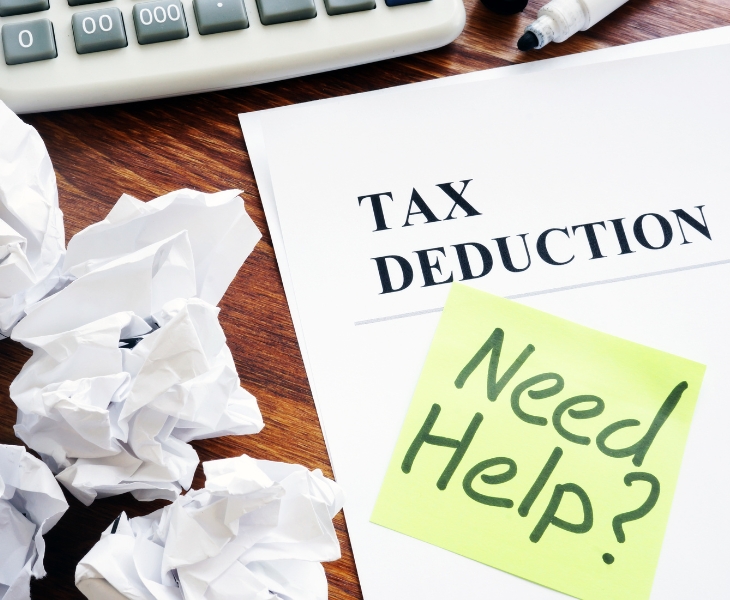As we’re at the end of financial year, it’s time to look for all possible opportunities to maximise your tax deductions. By proactively planning and organising your current finances you can reduce your taxable income and potentially earn a greater tax refund or lower tax liability. In this guide, we are going to share numerous tips for optimising your tax position, understanding deductible expenses and utilising government incentives.
Deductible Expenses
To get the most out of your tax deductions this EOFY, it’s important to have a clear understanding of deductible expenses. Deductions are costs incurred while earning your income, that can significantly lower your taxable income. Work-related expenses (such as uniforms or equipment), self-education expenses, charitable contributions, and investment-related expenses are all common deductible expenses. Similarly, business owners can deduct business-related expenses such as salary and wages, insurance premiums, advertising, and asset depreciation. While claiming work-related expenses, ensure they are directly related to your job and have not been reimbursed by your employer. Self-education expenses are deductible if they are directly related to increasing current job abilities or maintaining or improving existing qualifications. Donations to registered charities are also tax deductible, as long as you keep your receipts handy.
Keep Accurate Records
Make sure to organise and document all your expenses throughout the year, this way you can ensure that you are claiming all eligible deductions during tax time. Gather all of your eligible expenses’ receipts, invoices, bank statements, and other supporting documents. You can also consider using digital tools or apps to track and categorise your expenses.
- Designate a separate folder or use digital tools or apps to save all essential receipts and paperwork.
- To make identifying and claiming deductions easier, divide your spending into groups, such as work-related, self-education, and charitable contributions.
- Maintain a mileage journal: If you travel for work or use your vehicle for business purposes, keeping a mileage diary can help you to accurately calculate deductible vehicle expenses.
- Scan and save digital versions of your receipts and documents to keep them easily accessible and safe from loss or damage.
Government Incentives
Governments frequently give incentives and rebates to stimulate specific activities or investments. Keeping up to date on these tax breaks might give you additional opportunities to maximise your tax deductions. For example, first-time home purchasers may be eligible for a First Home Owner Grant, which can help lower the cost of buying a property. Similarly, small business owners may be eligible for instant asset write-offs or accelerated depreciation. It’s always good to Investigate current tax rules and regulations to locate any potential benefits that correspond to your financial situation.
Working from Home
Employees working from home have the opportunity to claim tax deductions for their home office expenses. They can choose between a fixed rate deduction of 67 cents per hour worked from home or calculate their actual deductions based on saved receipts and expenses. The fixed rate method covers common expenses such as electricity, phone, internet, and stationery, but additional expenses cannot be claimed under this method.
Checklist of expenses included in the revised Fixed rate are:
You can’t claim a separate deduction for any of the expenses the revised fixed rate includes. You can claim a separate deduction for:
One drawback of the fixed rate deduction is that it doesn’t consider fluctuations in expenses, potentially resulting in a lower deduction compared to individually calculated expenses. However, individuals who have the relevant receipts and documentation can claim their actual running expenses. To do so, they need to provide proof of expenses, maintain a record of hours worked from home, and accurately calculate the percentage of expenses related to work.
The actual cost method allows you to deduct actual expenses incurred as a result of working from home. You may be able to claim a deduction for each of the following expenses:
Checklist of expenses included in the Actual cost method:
Prepay Expenses
Prepaying some expenses before the end of the financial year is another efficient approach for maximising your tax refund. You can move the deduction forward into the current financial year by paying in advance for insurance premiums, subscriptions, or interest on investment loans. To ensure compliance with tax regulations, it is vital to study the rules and limitations related with prepayments.
Superannuation Contributions
Contributing to your superannuation (retirement savings) is not only a smart long-term financial strategy; it can also give instant tax benefits. You can reduce your taxable income through concessional (before-tax) contributions by increasing your super payments before the end of the financial year. This method has the potential to lower your tax liability while increasing your retirement savings. Just make sure you fall within the annual contribution limits and take advantage of any eligible government co-contributions or spouse contributions.
Seek Professional Advice
Consulting with a competent tax professional can be beneficial when it comes to getting the most out of your tax return. With all their experience and expertise they can provide you with personalised advice customised to your specific situation. A tax advisor can assist you in identifying qualified deductions, navigating complex tax regulations, and optimising your tax plan. They may also evaluate your financial records and guarantee that you are in conformity with all legal obligations, providing you peace of mind while maximising your tax savings.

